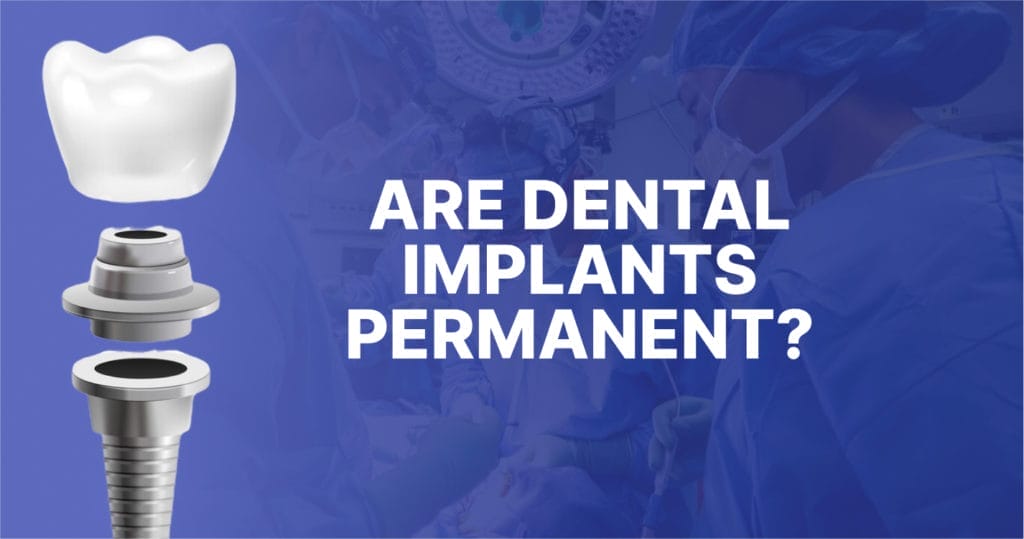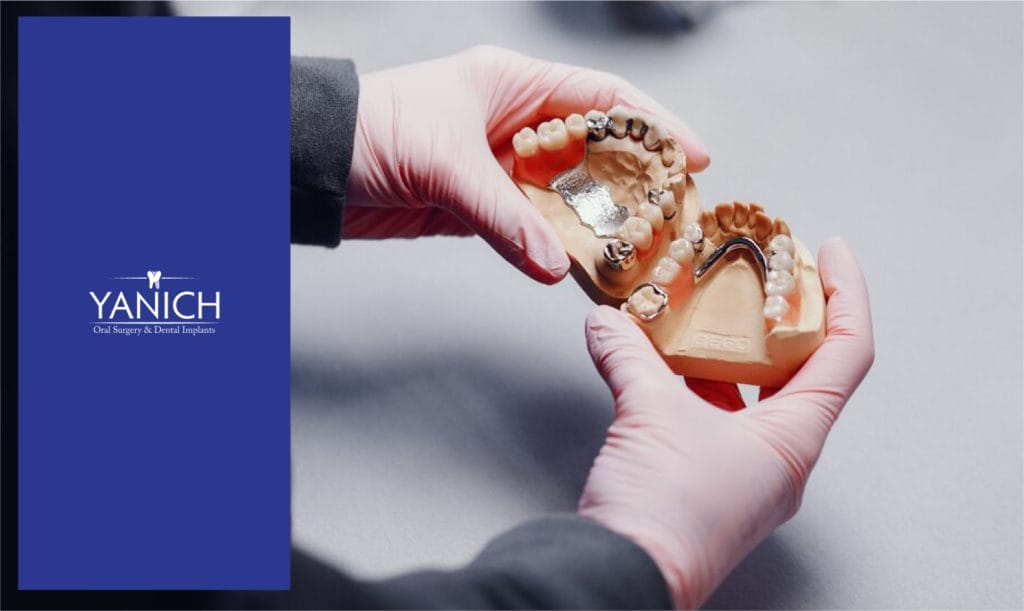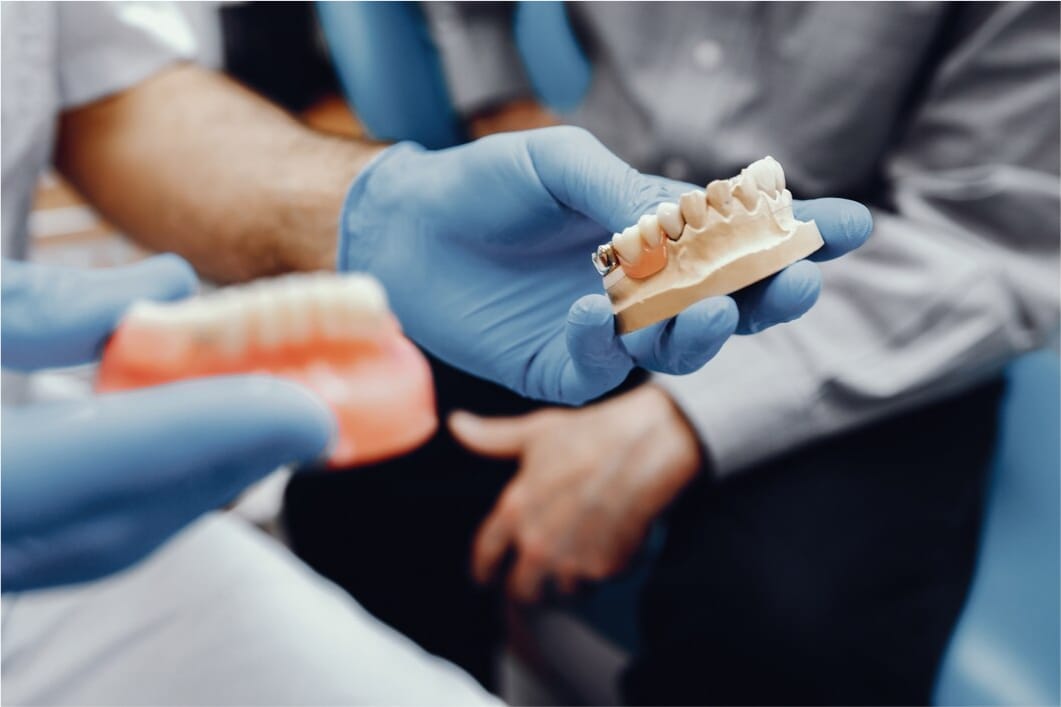Dental implants have revolutionized tooth replacement, offering a blend of durability, functionality, and aesthetic appeal that’s unmatched in today’s dental landscape. Typically lasting 10 to 30 years, these implants stand out as the longest-lasting option for tooth restoration.
But what exactly sets them apart, ensuring their remarkable longevity?
Read on to learn the key factors that contribute to their enduring nature and practical tips to maximize their lifespan, ensuring your investment in dental health pays off for years to come.
Understanding How Long Do Dental Implants Last
As a pinnacle of dental implant technology and restorative dentistry, dental implants have revolutionized the approach to replacing missing teeth in restorative dentistry and replicating the form and function of natural teeth. These implants serve a crucial role not just in improving aesthetics but also in preserving oral health.
Most dental implants prevent bone loss, maintain facial structure, and offer the comfort and efficiency of natural teeth, making them a superior choice for tooth replacement.
Structure: Crown, Abutment, Screw (Post)
- Crown: This is the visible part, designed to mimic a natural tooth. It’s crafted to match the color and shape of surrounding teeth, ensuring a seamless integration.
- Abutment: This component acts as a connector between the crown and the screw. It’s vital for holding the entire structure securely in place.
- Screw (Post): Considered the foundation, this part is embedded into the jawbone, acting as a synthetic tooth root. It provides the necessary support and stability for the entire implant.
Materials Used: Titanium or Zirconia
- Titanium: Renowned for its strength and biocompatibility, titanium is a preferred choice for the screw part of the implant. It integrates well with the bone, providing a durable and stable foundation.
- Zirconia: An alternative to titanium, zirconia is known for its aesthetic appeal and hypoallergenic properties. It’s gaining popularity for use in the crown and, in some cases, the screw, offering a metal-free option for those with sensitivities.

Are Dental Implants Permanent?
Exploring how long dental implants last reveals their status as a long-term solution, not just a temporary fix but a long-term solution. Their durability is one of their most significant advantages, offering peace of mind and functionality.
Average Lifespan
- Range: Dental implants generally last 10 to 30 years after implant placement. In many cases, they can last a lifetime. This lifespan significantly surpasses other dental restoration options.
- Key Influencers: Several factors affect the lifespan of an implant, including poor oral hygiene, gum disease, patient’s underlying medical conditions, and the implant’s position in the mouth.
Factors Influencing How Long Dental Implants Will Last
Understanding these factors can help you maintain your dental implants effectively, ensuring they last as long as possible. Regular dental visits and good oral hygiene are your best bet for keeping these sturdy, reliable fixtures in top condition for years.
- Oral Hygiene: Regular brushing, flossing, and dental check-ups play a pivotal role in extending the life of your implant.
- Patient Age: Younger patients might experience longer implant lifespans due to better bone density and overall health.
- Implant Location: Implants in the back of the mouth may bear more force from chewing, influencing their longevity compared to front teeth implants.

Comparing Dental Implants With Other Tooth Replacement Options
In tooth replacement, dental implants, including mini dental implants, offer unique advantages over options like partial dentures and dental bridges. Let’s break down how they compare and their unique advantages.
Dentures vs. Dental Bridges
- Stability: Unlike dentures, which can shift and require adhesives, implants are anchored in the jawbone, offering unparalleled stability.
- Bone Health: Dental bridges often require altering adjacent teeth. Implants, however, preserve natural tooth structure and prevent bone loss by stimulating the jawbone, unlike dentures or bridges.
Benefits Over Other Solutions For Missing Teeth Solutions
- Longevity: Implants are a long-term solution, often outlasting other options.
- Functionality: They restore nearly the same chewing and biting power as natural teeth, which is not always true with bridges or dentures.
- Aesthetics: Implants look and feel like natural teeth, offering a more natural appearance than other alternatives.
- Oral Health: By maintaining natural tooth alignment and preventing bone loss, implants contribute positively to overall oral health.

Maximizing the Lifespan of Dental Implants
Ensuring the longevity of dental implants, especially to prevent dental implant failure, requires diligent oral care and mindful lifestyle choices. Here’s how you can maximize their lifespan after your dental implant procedure:
Importance of Oral Hygiene Post-Dental Implant Surgery
- Brushing and Flossing: Regular brushing twice daily and daily flossing are essential to maintain implant health.
- Dental Check-Ups: Visiting your dentist every six months for check-ups and professional cleanings is crucial.
Lifestyle Factors
- Avoid Smoking: Smoking can impede healing and negatively affect the implant’s integration with the jawbone.
- Healthy Eating: A balanced diet supports oral health, which benefits implant longevity.
Protective Measures
- Nightguards for Bruxism: Using a nightguard can prevent damage from teeth grinding, which can strain implants.
- Mouthguards for Sports: If you’re active in sports, wearing a mouthguard can protect your implants from impact-related damage.
Understanding Potential Risks and Complications
- Pre-existing Medical Conditions: Conditions like diabetes or osteoporosis can impact the success of dental implants.
- Regular Dental Visits: These visits are not just for cleaning; they’re also crucial for early detection and management of any issues that could compromise your implants.
Final Thoughts
Dental implants, a permanent solution to tooth loss, represent a significant advancement in dental care, offering a solution that combines aesthetics, functionality, and longevity.
As the best option for tooth replacement, they restore your smile and contribute positively to your oral health. Remember, diligent care and mindful lifestyle choices are the key to maximizing their benefits, which is especially vital for those who have undergone a bone graft or have dental crowns.
Embrace the change that dental implants can bring to your life –– contact us today to schedule a consultation and take the first step towards a brighter, more confident you.


